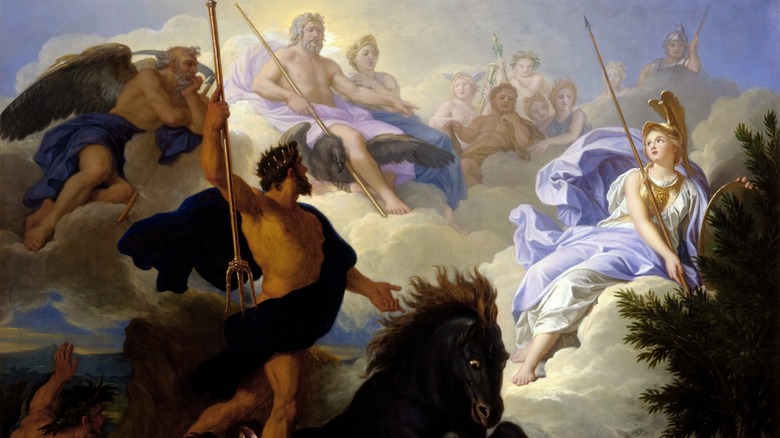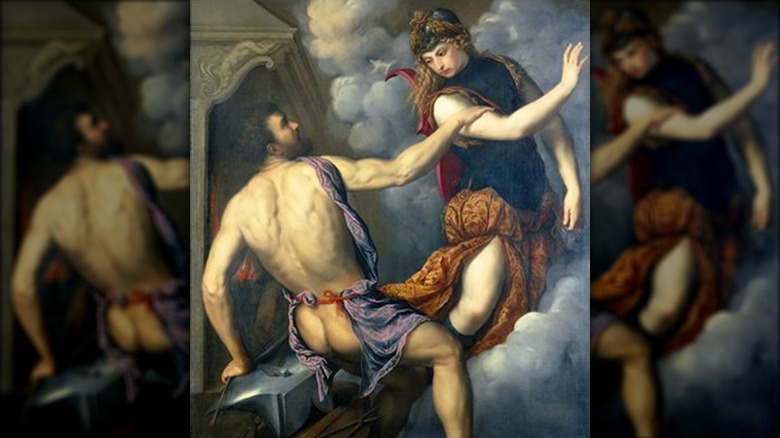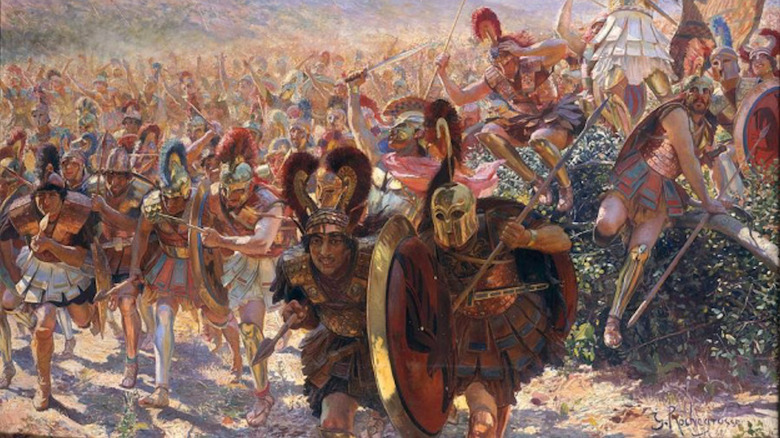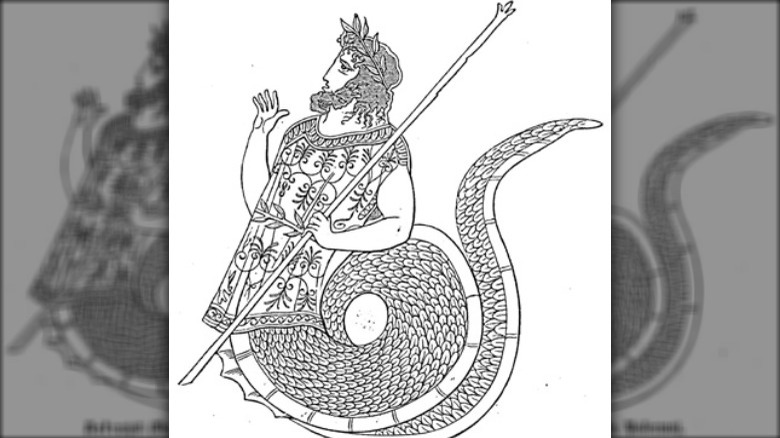How Athens Altered Its Founding Myth During Its Cultural Peak
When people today think of Ancient Greece, they are almost certainly picturing the city of Athens. As the World History Encyclopedia explains, this is thanks in part to the fact that the history of ancient Athens is better documented than other cities, but also because at its height of power and influence, it was a leader in the development of the fields associated with Ancient Greece, such as philosophy, politics, math and science, and the arts. However, the city did not rise to be a major power within Greece until the Persian invasion in the fifth century BCE.
One sign of the relative unimportance of the Athenians in early Greek history is their presence -– or rather, lack thereof –- in Homer's "Iliad," essentially the earliest piece of written Greek mythology we have. According to the Center for Hellenic Studies, Athens is barely mentioned throughout the epic, and there's a good chance you've never heard of Menestheus, the king of Athens who fought in the Trojan War. However, Athens is mentioned in the famous (or infamous) Catalogue of Ships, which counts out how many soldiers each city-state brought in a way that mirrored how Bronze Age Greece's geography was politically divided.
While the Athenian presence in the Trojan War is modest, this section does contain our earliest record of an Athenian founding myth, one that would come to be modified somewhat as the Athenians rose in prominence among the Greeks.
The icky origins of Erechtheus
As the Center for Hellenic Studies explains, the "Iliad" refers to the Athenians as "the people of great Erechtheus, whom once Athena the daughter of Zeus raised, and who was born of the life-giving soil itself." The Oxford Classical Dictionary expands on this by saying that while Erechtheus is possibly the oldest founding hero of Athens, there is no surviving account of his life from those early days, but an important detail that is preserved in Homer is that he was born of the Earth itself. This detail became important for Athenian nationalist ideals since it confirmed in Athenian minds that they were autochthonous –- that is, that they arose from the land of Athens itself; they weren't immigrants, there was no one there before them, Athenians literally were, according to legend, Athens.
The worship of Erechtheus was closely tied to the worship of Athena, the patron goddess of Athens, and of course, Homer says that she raised and nursed Erechtheus. If Erechtheus is the same figure as the similarly-named Athenian founding hero Erichthonius (which he may or may not be), then his origin is that he was conceived when the blacksmith god Hephaestus made an ill-considered advance on the virgin goddess Athena, and when she rebuffed him, he nevertheless, uhh, spilled his seed on her leg, which she wiped off into the dirt. The Earth then gave birth to the snake-legged baby Erectheus/Erichthonius, whom a sympathetic Athena raises to be the legendary founder and king of the city-state of Athens, her holy city.
The rise of Athens
As the World History Encyclopedia explains, Athens' star was on the rise in the centuries following the composition of the Homeric epics, which were first written down in the 8th century BCE. In the 7th century, the famous Athenian lawgiver Solon laid the foundations for what would become Athenian democracy by creating laws that helped level the field of power between aristocrats and common people. But an even bigger turn around came in the aftermath of the Persian Wars. The Athenians distinguished themselves with their victories at Marathon and Salamis, which established Athens as a military superpower. Following this conflict, the Athenians established an empire under their leader Pericles, leading to the so-called Golden Age of Athens in the 5th century BCE, when a lot of famous Greek people you've heard of like Socrates and Herodotus flourished.
As the Oxford Classical Dictionary says, by this time Athens saw itself as a paragon of civilization, and myths about snake men born from the dirt after a horny god tried to get it on with his half-sister were for some reason seen as monstrous and crude. As a result, the Athenians began to distance themselves from Erechtheus as a foundational figure by adding a number of intermediary figures to his family line, ultimately giving themselves a new founding king named Cecrops. Meanwhile, it is possible that the story of Erechtheus' birth was transferred over to a new figure, Erichthonius, who comes a little further down the line in the new Athenian genealogy.
There's a new snake king in town
The story of Cecrops is recorded in the "Bibliotheca" of Pseudo-Apollodorus, a compendium of myths gathered around the 2nd century CE based on stories from earlier centuries. As Theoi records, Cecrops was, like Erechtheus, born from the Earth itself and snake from the waist down, allowing the Athenians to maintain their autochthonous origins even as they shifted away from the more unsavory aspects of Erechtheus' birth.
After Cecrops becomes the first king of Attica (where Athens is) and names the place Cecropia after himself, the gods Athena and Poseidon come down, each claiming the place as their own holy city because it is so great. To this end, Poseidon offers Cecrops as a gift a saltwater spring that he makes bubble up from the ground with his trident, while Athena attempts to sway him with the invention of the olive tree, which would go on to provide the Greeks with essential wood, food, and oil. Long story short, Athena wins and the city is renamed Athens after her.
While Cecrops maintains some of the monstrous appearance of the earlier culture hero Erechtheus, importantly he is a figure of civilizing influence for the people of Attica. He is credited with the invention of marriage (a metaphoric reflection of his own double-bodied nature), organizing Athens into 12 political divisions, and updating sacrifices to Zeus from bloody animal slaughter to the offering of special cakes to represent bulls, among other advancements. In the updated myth, Athena gives the care of her foster-son Erichthonius over to Cecrops' daughters, where he later ascends to the throne of Athens.



